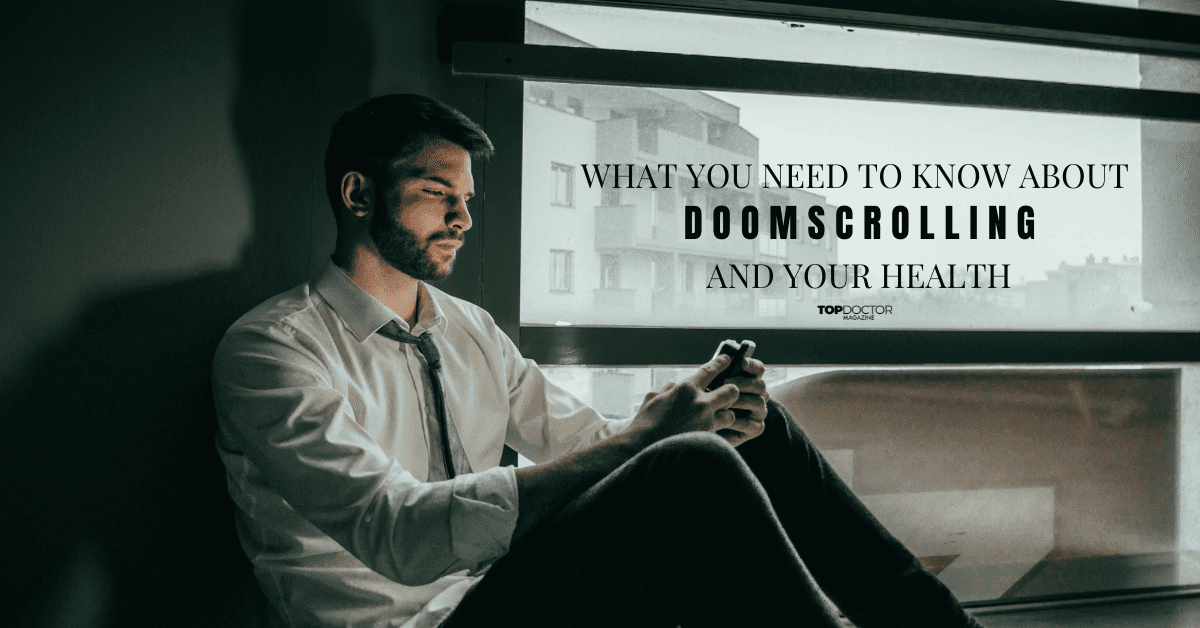The work day has ended, and off to home it is. Food has been eaten, teeth have been brushed and now to bed you go. You suddenly get a Twitter notification … the world is being shut down due to a deadly disease! You panic and scroll, reading article after article about the situation, wondering whether it will affect you, and then you mass text everyone you know. You can’t sleep, so you check your phone constantly for updates. The next day, you hardly do any of your tasks, and you can’t stop checking the news.
This phenomenon is known as “doomscrolling.” If you or someone you know struggles with doomscrolling, acknowledging what it is and the fact that you struggle with it can pull you out of this endless, addictive spiral.
What Is “Doomscrolling?”
The simple definition of doomscrolling is the tendency toward or continual consumption of bad or negative news without showing signs of stopping. Some people can receive news updates and react calmly, but other media consumers will read the news and obsess over reading article after article. These readers spiral into a world of endless information where they feel the need to read everything. They grow depressed while becoming addicted to reading the media.
Although the term “doomscrolling” was coined on Twitter around 2018, doomscrolling made its way to center stage at the beginning of the COVID-19 pandemic. People scrolled through social media, combed articles, read graphs and looked at statistics to see the COVID-19 numbers grow. Dr. Kate Mannell, a media studies researcher at Deakin University, said COVID-19 pushed the public toward doomscrolling because of the plethora of articles and information, as well as the lack of an escape from this information.
What Does Doomscrolling Mean?
Doomscrolling is highly detrimental to physical, mental and emotional health. Excessive media consumption, particularly this negative media that doomscrolling is associated with, can lead to both addictions and depression.
For people who have pre-existing mental health conditions, excessive media consumption makes matters worse. Likewise, people with no underlying mental health conditions report feelings of negativity. It makes it hard to see any good in the world where it seems like everything is going wrong.
Several studies suggest that doomscrolling can worsen mental and emotional health. The Health Communication journal suggested that doomscrolling is often associated with poorer physical and mental health and higher levels of anxiety, stress and depression compared to consumers who do not take in as much negative media.
One study found that approximately 16.5% of the participants showed signs of doomscrolling with increased levels of mental and physical health issues. Other studies indicate that among those with severe media consumption levels, 74% reported experiencing mental health problems, and 61% reported physical problems.
Although some people use it as an avoidance technique to cope with anxiety, doomscrolling keeps people from getting good sleep, connecting with others and completing tasks. While doomscrolling is a horrible habit, many people who doomscroll report an addiction to it as well as a tendency to catastrophize more.
Additionally, doomscrolling activates fight-or-flight emotions. The constant consumption of negative news creates stress and anxiety in an environment where the world is perceived as dangerous. As these flight-or-flight emotions increase, a cycle develops in which people obsess over the news and often check it in order to control their emotional distress. This fight-or-flight response can physically impact people since it’s linked to digestive issues, headaches, heart disease, weight gain and high blood pressure.
How To Avoid Doomscrolling
Doomscrolling is addictive; there’s no question about it. Once you fall into the habit, it becomes easier to spiral into the never-ending void of disheartening news. So, if you think you’re prone to doomscrolling or know someone who is, try to take these steps to avoid spending time in the endless tunnel of information.
Some people found that what worked best for them was limiting the amount of news they read each day, such as reading one long piece of reputable news rather than many, or going straight to the source. For example, in the case of COVID-19, many people went straight to the CDC website for information.
Experts say switching the media off entirely isn’t the key to stopping doomscrolling. Instead, we should encourage people to admit when their news consumption is detrimental and addictive so they can take steps to limit their media consumption.
Other experts recommend setting a time limit on social media apps so that the timer can provide a stopping point during a doomscrolling session. Either set limits on how much time you spend on apps like Facebook, TikTok, Twitter, etc., or delete them from your phone and access them from your browser.
Creating physical boundaries is another great way to prevent excessive media consumption. For example, leave your phone and computer outside your bedroom before going to sleep and make it a screen-free zone, or keep the phone in your purse when you’re working, so you aren’t tempted to look at it.
Asking friends and family for help can be some of the best ways to stop doomscrolling and manage the feelings it causes. Your friends and family can be some of the best forms of support while you struggle with this harmful habit.
A Parting Reminder
Perhaps you or someone you know struggles with doomscrolling. Maybe it doesn’t seem like a huge issue, especially when there’s a lot of information out there that you feel the need to relay or read. The problem is that doomscrolling can affect your health in many ways. It heightens mental and emotional health issues but with detrimental physical effects. If you want to stop this cycle, set limits on your media consumption, practice gratitude and reach out to friends and family who can support you when it feels like the world is falling apart.






0 Comments